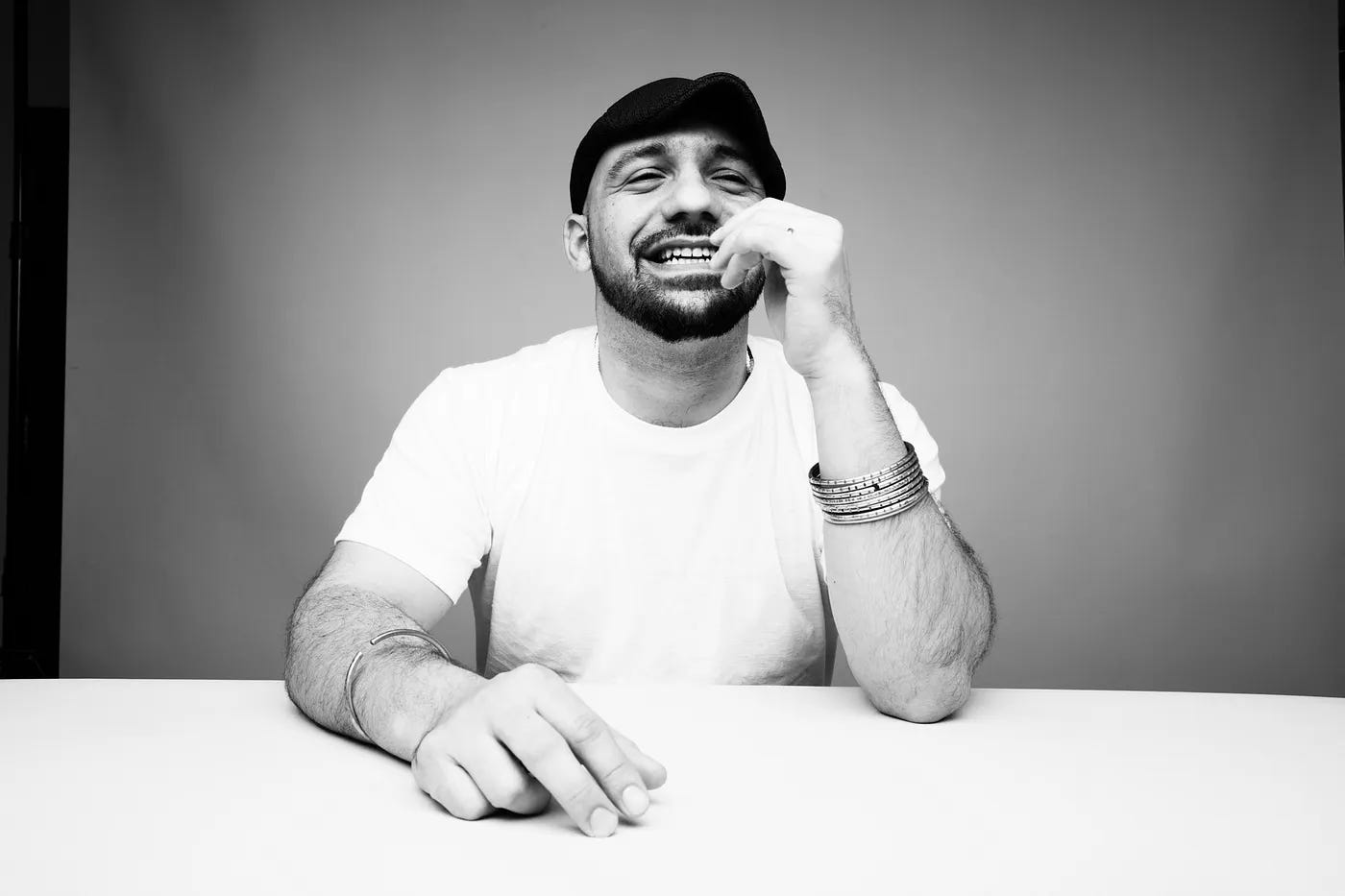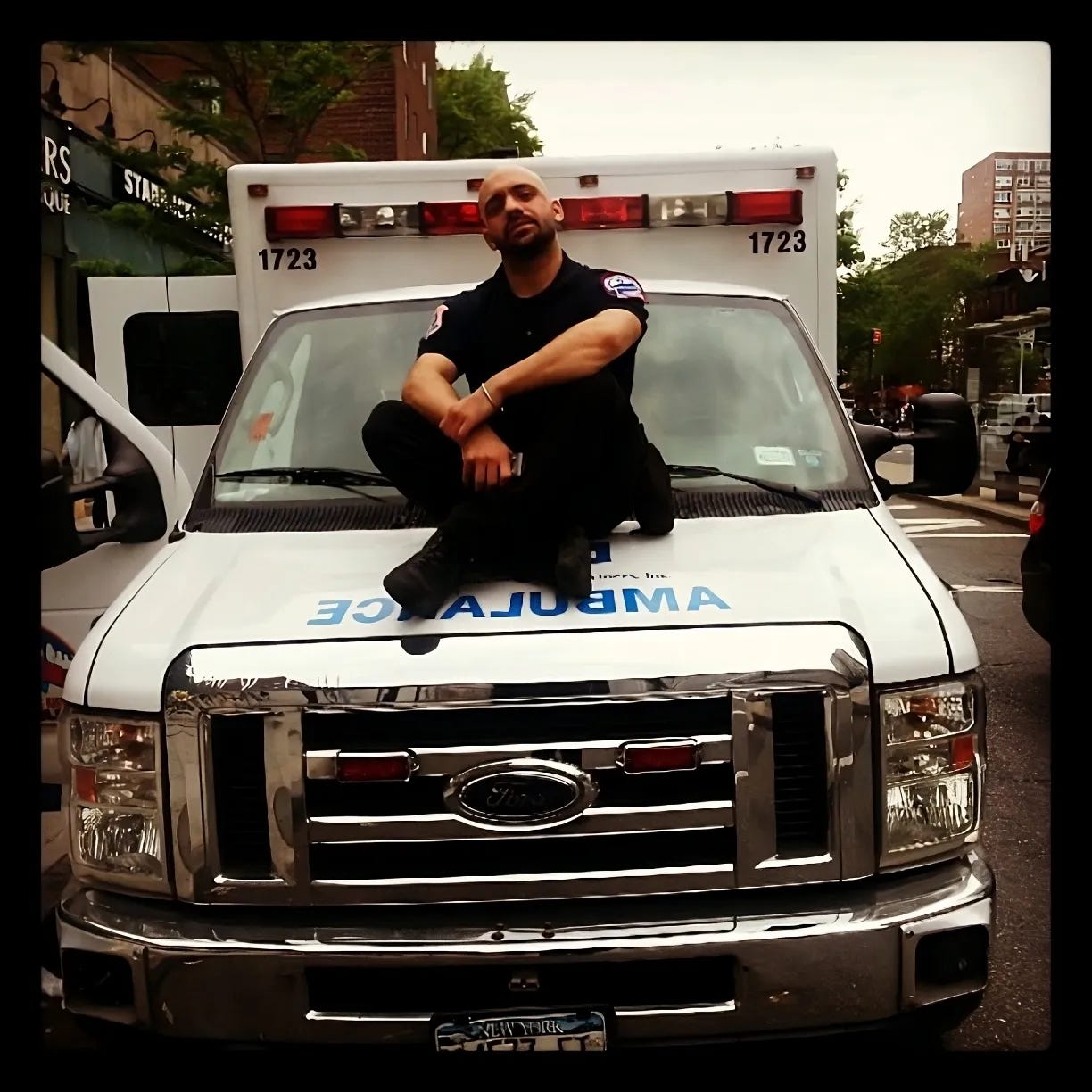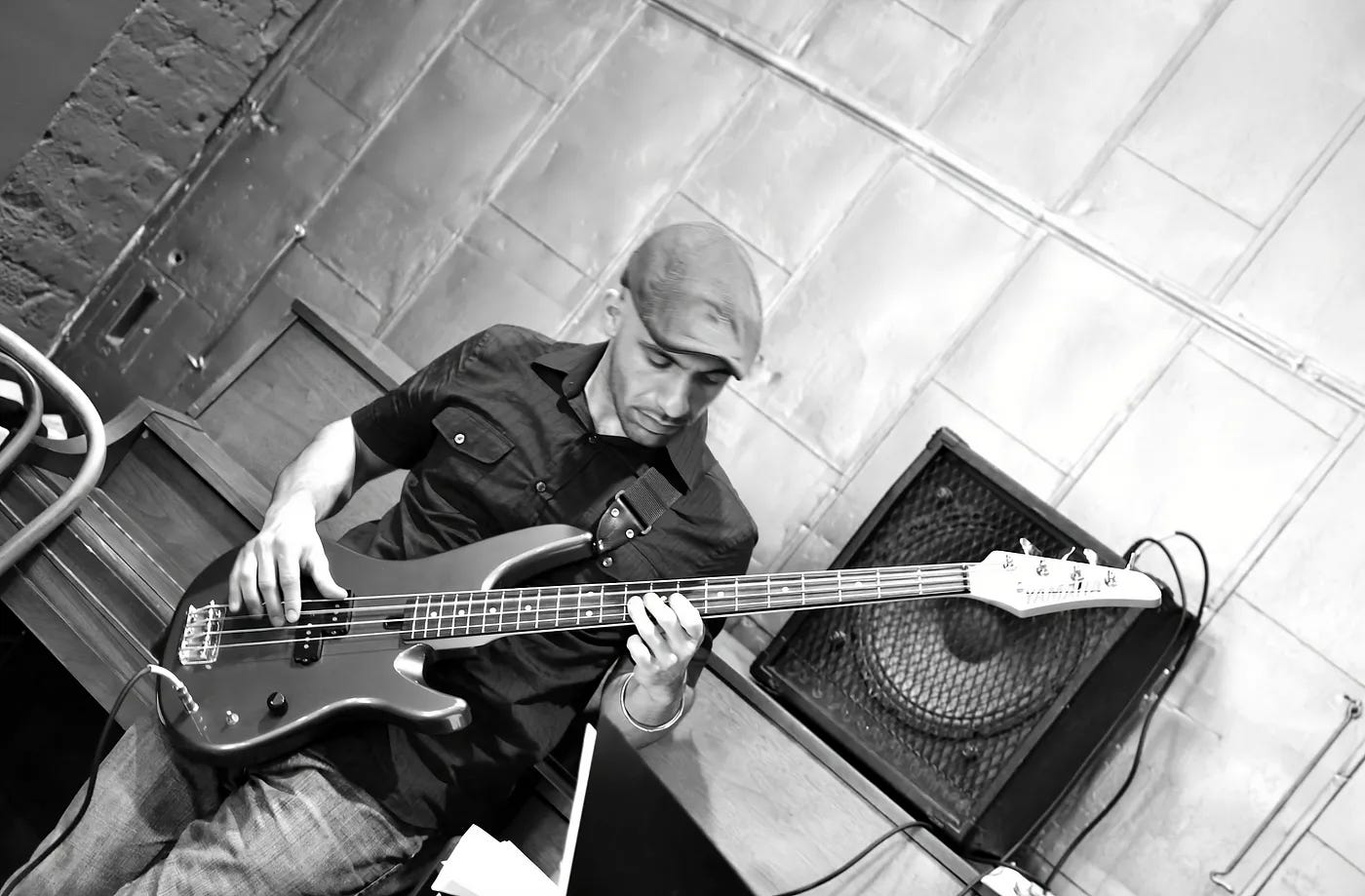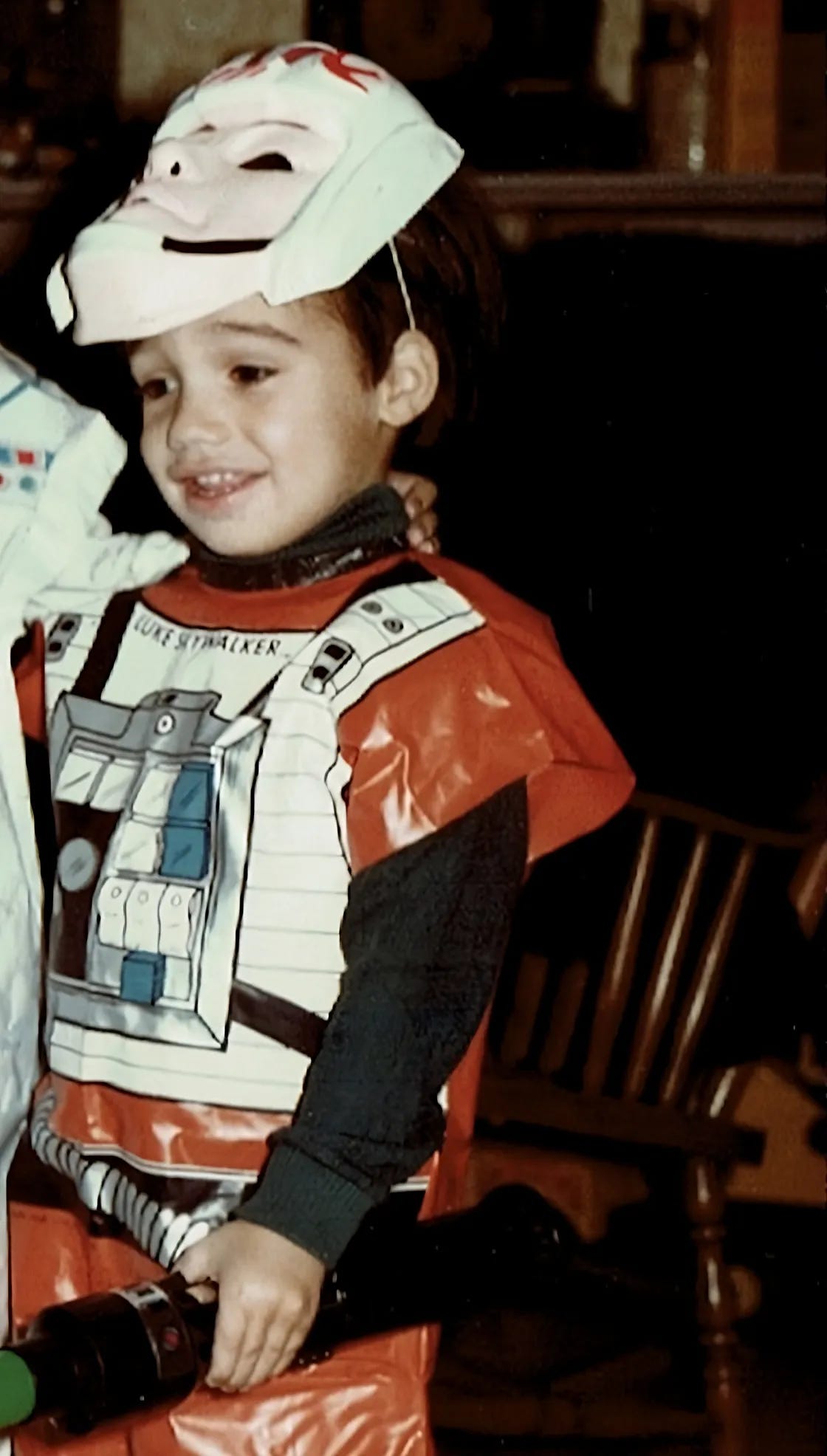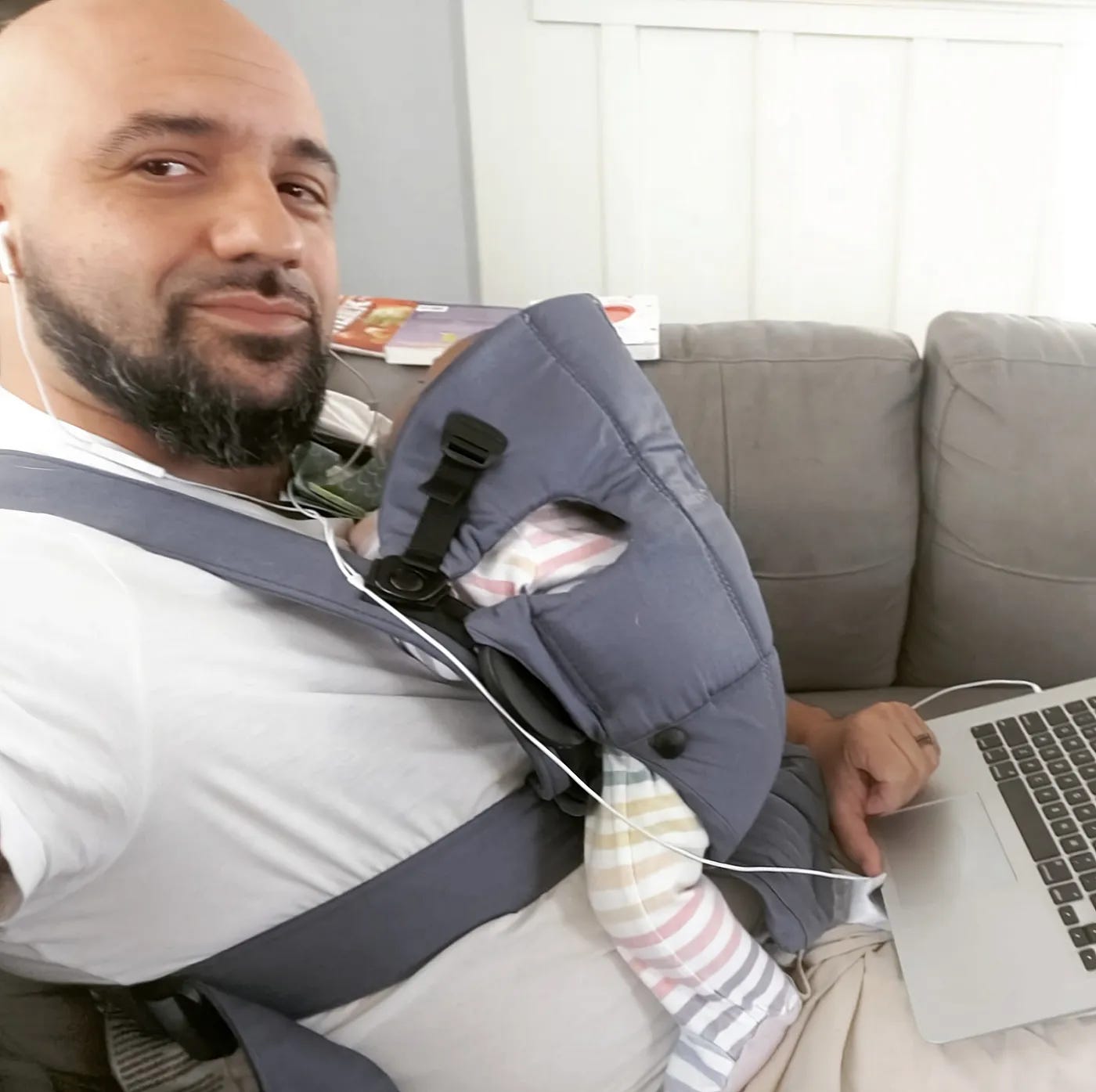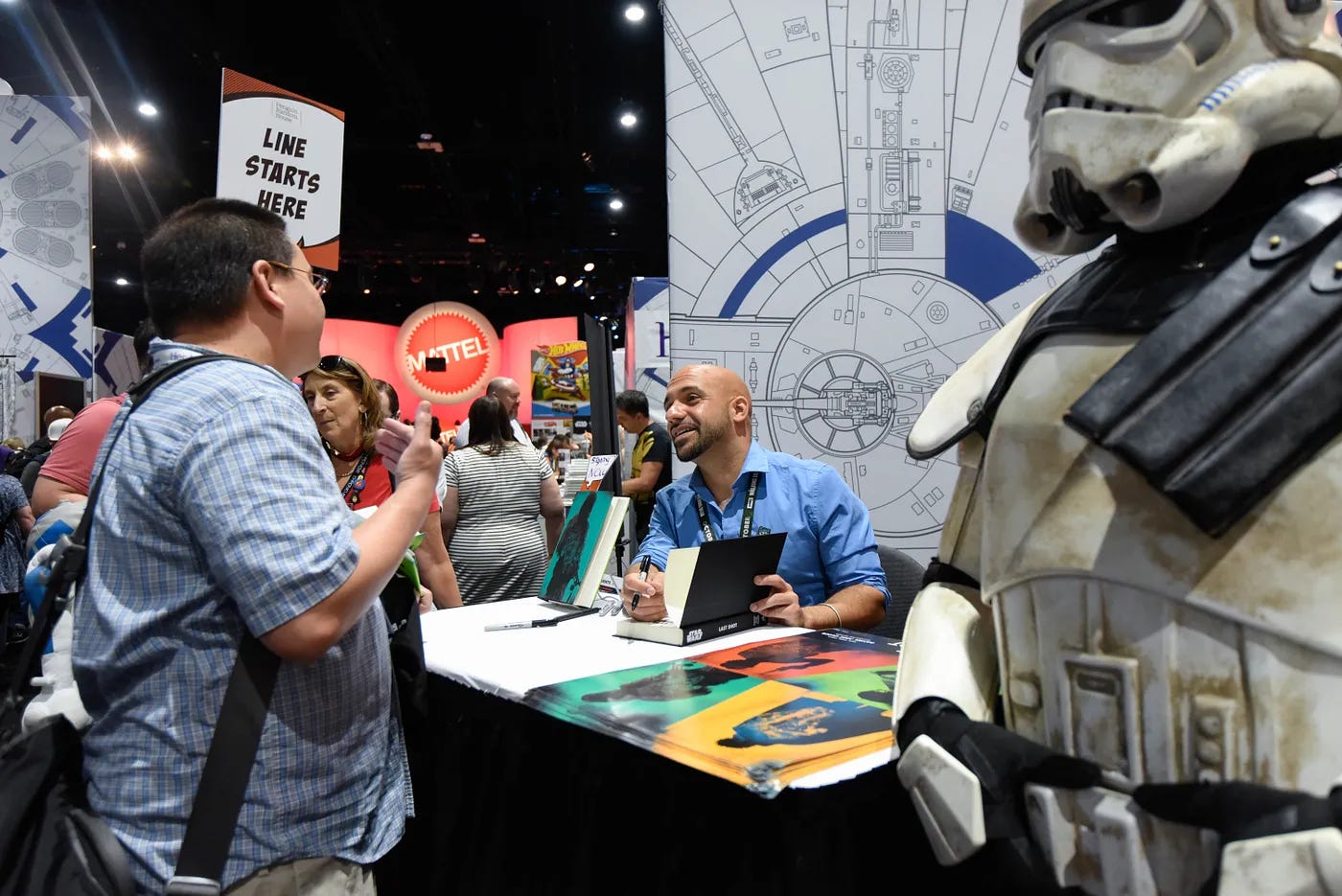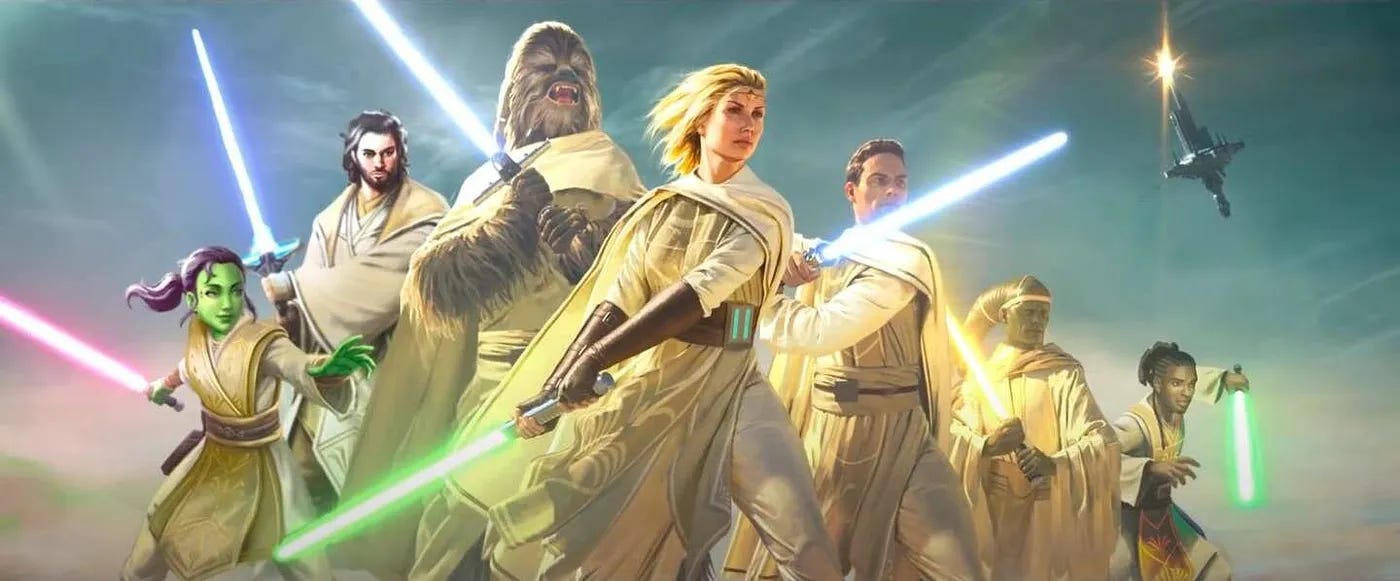Q&A with Daniel José Older: The 'Star Wars: The High Republic' Author on Learning to Write by Living
The writer discusses finding truth in fiction, embracing all art, and the thrill of playing around in a more inclusive 'Star Wars' sandbox
Last year around this time, I wrote a Twitter thread about TOP GUN: MAVERICK that caught the attention of quite a few artists I counted myself as a fan of. One of them was
— the New York Times-Bestselling author of books like SHADOWSHAPER (2015) and THE BOOK OF LOST SAINTS (2019) and, more intriguing for a devoted STAR WARS fan such as myself, one of the key architects of the new STAR WARS: THE HIGH REPUBLIC multi-media story that spans novels, graphic novels, and, now, television. On top of that, the guy is just cool. He’s one of those rare people I meet on social media whom I genuinely look forward to one day grabbing a beer with and getting to know better.When I approached Daniel about chatting for my artist interview series, he was as enthusiastic as I expected him to be. I discovered a person whose childhood backstory didn’t overlap with mine at all, but whose adult pursuit of the arts did. He and I both put a large emphasis on living as part of our creative training, and while I can’t speak with any objectivity about how it’s shaped my art, I think its impact on Daniel’s is clear. As you read, you’ll learn more about his unique journey, his relationship to the arts throughout his life and how that has informed his writing, and, because it’s just too awesome not to talk about, his hand in the future of STAR WARS.
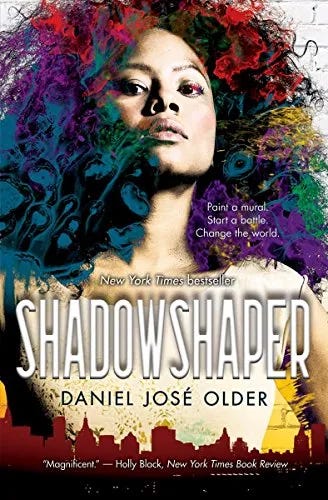
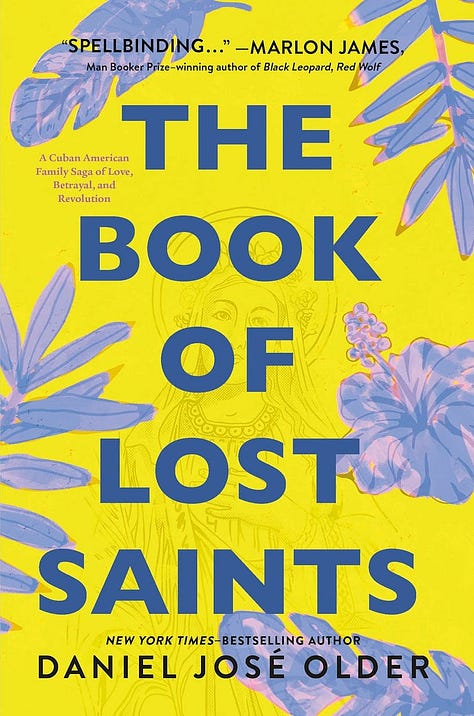
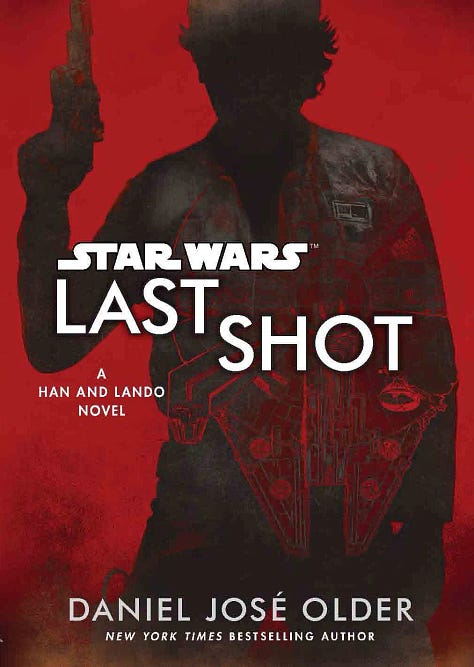
DANIEL JOSÉ OLDER: It was always going to be storytelling in one form or another, I just didn’t know which medium or how I was going to get there. Left college really planning to make it with music, and for most of my twenties, that’s what I was doing on the other side of all those jobs. And yeah, there was one period where I was community organizing at several spots while working on the ambulance and holding a band together. Nuts. So, on one level it was about paying the rent, all those jobs. On another level, it was about lived experience. I knew whatever storytelling form I ended up with, it would involve me drawing from what I’d done with my life along with whatever research, inspiration work, etcetera. I’d immerse myself in it.
It’s something I tell students a lot now — don’t worry about getting a job that involves writing or publishing. Find a job that lets you do your writing. The overnight security guard probably gets a lot more writing time in than the publishing industry intern — and has better benefits.
It’s something I tell students a lot now — don’t worry about getting a job that involves writing or publishing. Find a job that lets you do your writing.
For me, that was being a medic. We worked twelve-hour shifts, so three a week was full-time. I wrote on some, not all, my pass days. On slow shifts, I’d write in the stretcher in the back. There was one at the top of the Bronx, this real suburban little enclave with a bunch of nursing homes and tidy little houses where almost nothing happened on the graveyard shift except a cardiac arrest or two, and the other ten hours I’d be plugging away, slinging words at the page.
CH: As far as I’m concerned, it’s the best advice one could give an aspiring storyteller outside of reading and watching films/TV. Too many artists I know graduate from whatever program they were in, and immediately dive into trying to explain the world to audiences without ever having experienced that world. In Hollywood, the result is films about experiences in other films, a kind of simulacra of human experience. In fact, I blame the temporary death of the rom-com on this in the early aughts.
DJO: Right. Like, yes read, read, read, and immerse yourself in your medium, of course! But it can’t, shouldn’t, and doesn’t have to be at the cost of living. Fully living. There’s a persistent ugly myth out there that we have to choose — life or art, experience or literature, take your pick — and it’s false. A false dichotomy and a false notion. We become better storytellers by living. And we become better storytellers by listening to people who’ve lived but might not be professionals in our industry. My partners on the ambulance were some of the best storytellers I’ve ever known, including all my writer buddies. And heartbreak is best teacher of them all. No movie, book, or song can teach you what that actually feels like, although they can remind you that you’re not alone once you’ve felt it.
There’s a persistent ugly myth out there that we have to choose — life or art, experience or literature, take your pick — and it’s false. A false dichotomy and a false notion.
CH: My break didn’t come until I was in my thirties, and by then I had worked as a lawn jockey, maintenance man, and video store clerk, designing what we called “camouflage” for prototype cars in the automobile industry, and as a freelance arts and culture journalist. I’d done that across the States and in multiple countries, too. It was an education even more valuable than what I picked up at university. What do you think all those jobs taught you about life and do you think they inform much of your work these days?
DJO: Specifically with being a medic, I went into it very aware that there’s a temptation for artists to see ourselves as outside the world somehow, the teller of the story not part of the story. And I knew that was false on a number of levels. I wanted a job that would absolutely banish that notion from my head, a job that would not only remind me I can never be outside of the world, of the story, but would also thrust me headfirst into the shit of it. A job, basically, that involved a duty to act.
This was the quote — by one of my favorite writers, Eduardo Galeano — that kind of lit that fire in me back in college: “I’m not asking you to describe the rain falling the night the archangel arrived; I’m demanding that you get me wet. Make up your mind, Mr. Writer, and for once in your life be the flower that smells rather than the chronicler of the aroma. There’s not much pleasure in writing what you live. The challenge is to live what you write.” I can’t even do a smart, heady analysis of those words. I just know they changed me and put me on my path.
CH: Your sister Malka Older is a novelist, too. What was in the food your parents were feeding you two?
DJO: [Laughter] My wife is a full-time writer, too — Brittany N. Williams. Her debut was just released, in fact!
CH: Jesus, that’s one hell of a family.
DJO: As for my parents, they were — and remain — super-encouraging and thoughtful. Besides the fact that there were books everywhere in the house and stories seemed to float through the air all around us, two things stand out, thinking back:
First of all, they found a healthy balance between encouraging all our weird, out-there ideas/interests and still being real about things, offering helpful critique, talking through process, etcetera. I took it for granted some at the time because it was my norm, but as an adult, I realized how special and rare that is, to know how to walk that tightrope and to even bother trying. I was obsessed with being a political cartoonist when I was like eleven, and they took that really seriously without being assholes about it or trying to live vicariously through me. The local comic paper had open editorial sessions where you could look through the stack of possible cartoons for that week and offer advice, and my dad and I became regulars and would talk about what worked and what didn’t. But it was just natural, not like, “Let me teach you a lesson, my son.” Yeah, it taught me a lot about the editorial process, etcetera, etcetera, but more importantly it built in me a natural instinct to take my passions seriously and follow through with them without being overly precious or obsessive. That balance.
It was never high art/low art or whatever other nonsense people use to justify not paying attention to something that makes them uncomfortable. And you know, there’s an honesty to that — Shakespeare would’ve fucking loved STAR WARS.
CH: And the second thing?
DJO: They didn’t get caught up in that snobby hierarchy bullshit a lot of folks subscribe to. Like, we did then and do to this day bring the same level of analysis and appreciation to STAR WARS as to Shakespeare, or Gabriel García Márquez or THE GODFATHER, or the history of colonialism, or the daily news. It was never high art/low art or whatever other nonsense people use to justify not paying attention to something that makes them uncomfortable. And you know, there’s an honesty to that — Shakespeare would’ve fucking loved STAR WARS. They’re all in conversation already. The question is: are we willing to be in that conversation, too? And I believe strongly that that approach makes people better creators, better writers, better storytellers, and better readers. And, I guess most importantly, better humans.
CH: Back when STAR WARS: A NEW HOPE was rereleased — the Special Edition — I showed up at my local theater to wait in line to buy tickets. I was in my twenties at this point, and I was stunned to see all the cool kids from high school, all the ones who used to make fun of my geek shit, were in line, too. I think about that often when it comes to culture snobs who tell you what “real art” is, the kind who run around anointing this or that book “literary” and panic at anyone who muddies the water between the two…because I know a lot of these kinds of people and I can tell you they geek out just as hard if not harder than I do about STAR WARS or STAR TREK and the like.
DJO: You know — I was a RETURN OF THE JEDI kid through and through. That was the first movie I saw in the theaters. It rocked my world, terrified me, changed me. Definitely became a foundation of my storytelling sensibilities, and I’m thinking here most specifically about the Jabba’s Palace sequence at the beginning.
CH: That first act blew me away.
DJO: There’s just something about that whole part that stayed with me, struck me as so thrilling and somehow so true. But more recently, I remember going to THE FORCE AWAKENS with my dad and seeing the Falcon swooping through those downed Star Destroyers, man — that feeling. It was like, we’re back. Or as Han says in the movie, “Chewie, we’re home.” It’s been amazing to see STAR WARS come into its own for a whole new generation, even more amazing to get to be part of that, and particularly to be able to tell stories that center folks who traditionally haven’t been front and center in sci-fi/fantasy.
CH: I’m going to come back to your part in STAR WARS today in a moment. For now…you are prolific, to say the least. Walk me through how you manage your time and meet all those deadlines.
DJO: I wish I had a great answer for this because I get asked it a lot and it’s a great question. But on some level it’s just that this is a job — even if it’s the best job in the world, it’s still a job — and one of the ways I get it done is by treating it that way. That “never work a day in your life/do what you love” thing always makes me laugh, because, dude — writing is work. It’s amazing work, it’s life-changing work, it’s healing work, but it’s work. I work harder as a writer than I ever did as a medic, and I worked my ass off as a medic.
But anyway — yes, it’s about showing up, but I think even more importantly, it’s about self-reflection, right? And I’m curious about your thoughts on this part. Like, if we’re doing it right, we are always, always, always checking in with ourselves about what works and what doesn’t in our process, what gets it done but takes us out of commission, what makes things slower going, but helps us stay the course for longer. Are we outlining or are we free forming? Do we need a break?
On some level it’s just that this is a job — even if it’s the best job in the world, it’s still a job — and one of the ways I get it done is by treating it that way.
CH: Agreed. That self-reflection is absolutely critical to a writer’s survival, not just as a professional, but as a human being. I see it as a mental health issue that covers both how I do my job and when I do my job. For example, when my first son was born, those first six or seven months were, as you know, a chaotic time. I worked when he slept, whenever I could, really. But after things normalized, I didn’t stop. I was going morning, noon, and night, seven days a week because I’d forgotten how to just…live. My wife pointed that out to me, and I immediately imposed a work schedule on my life, nine to five every weekday. I don’t work nights or on the weekends, except when different time zones put me on a Zoom these days. My enjoyment of my kid, my wife, and life generally improved while, counterintuitively, my productivity did, too.
DJO: Exactly. People really don’t realize that your work gets better from a healthy work/life balance. True productivity, in my experience, is grounded in two things: listening and self-care. Period. That’s non-negotiable.
CH: Hell yes.
DJO: We think — capitalism, really, encourages us to think — that we can take measure of ourselves based on our word count or Goodreads ratings or hours in the chair. But that’s a lie. We are much more than that, first of all, and all those things go out the window when we burn out. Burnout is a dramatically unproductive state, but so much bad advice — “write every single day, otherwise you’re not a writer” — sends us hurtling in exactly that direction.
Anyway, for all these reasons, I didn’t set out to be a prolific writer. It was never the goal. It happened because I sold books in series, and one led to another, and I kept hitting deadlines and writing books people want to read, and here we are. But I measure myself as a writer not by my bibliography so much as the number of people who’ve come up to me to say my work has impacted their lives, the people who realized they wanted to and could be a writer because of my work, the people who found themselves in the pages of a book for the first time in my stories.
CH: So, at this point, I was wondering if you could give me some exciting spoilers about what’s to come in the STAR WARS: THE HIGH REPUBLIC series. Let’s blow up the internet.
DJO: [Laughter. Just lots of laughter].
CH: Okay, I’m kidding. But I am intrigued by your role in THE HIGH REPUBLIC world. This is a stretch of new canon spanning three centuries, up to a period about fifty years before the films, which involves novels, comic books, and now a television series. You’ve had an integral part in all that as one of its key architects. Can you talk me through what that means?
DJO: It’s really been a highlight of my career to be part of this project. Essentially, we formed a writers’ room, and, in collaboration with Story Group and various creative executives at Lucasfilm, created the building blocks of this new era, the big beats of a massive story we’re all telling together, and the basic breakdown of how we’d tell that story through books and comics. A lot of the impulse for this was that the publishing wing of STAR WARS has traditionally been working in cohesion with the films — my novel LAST SHOT, for instance, tells a story that connects Han and Lando’s young and restless days to their more mature, midlife era in the aftermath of RETURN OF THE JEDI, and that was specifically designed to connect to the movie SOLO. And that’s all a ton of fun, of course, but there are quite a few limitations that come into play with that kind of storytelling, and THE HIGH REPUBLIC was really a chance to carve out a whole area of the Galaxy Far, Far Away — or as it turned out, a time period — that the books and comics folks could have the full run of, at least at the beginning. So, we got to really design the look, feel, and overarching story of this era, and as we move towards the third phase of our storytelling, we get to see shows like “THE ACOLYTE” and “YOUNG JEDI ADVENTURES” telling their own stories in the High Republic, which is a whole other kind of thrill.
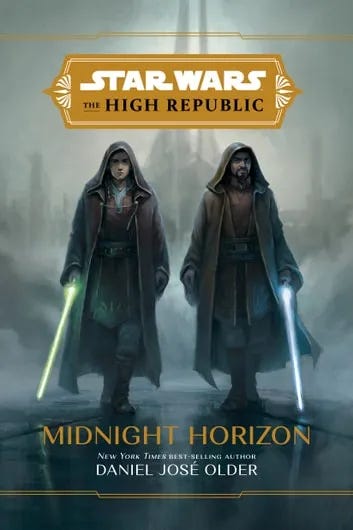
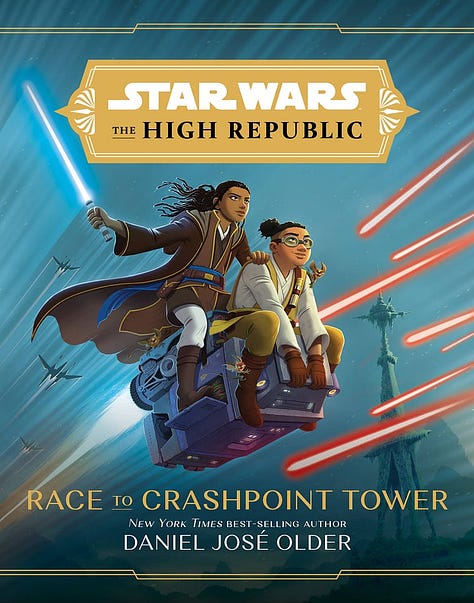
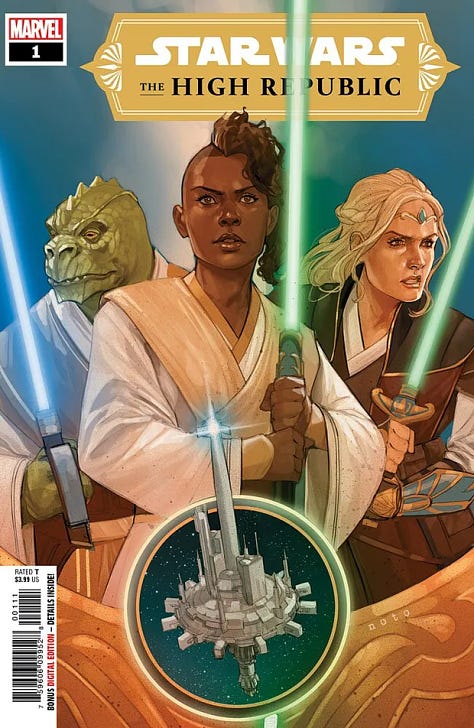
CH: You just called it a writers’ room, and that’s what I thought when I heard about how the project was executed— that it had much more in common with a TV writers’ room than what authors typically do. Were there any challenges working as part of a team posed to someone used to work alone?
DJO: Totally. It’s definitely had its struggles as a process, but they’ve been good ones, self-imposed challenges, I’d say. Like, one of the joys of this initiative is the crossover aspect of it, so a character that first shows up in a novel will make an appearance in the comics. Sometimes we’ll show an event from several different points of view in several different mediums. Which is so cool, and the essence of STAR WARS in some ways. But, of course, that’s really hard to coordinate, especially with changing deadlines and release dates and an ever-growing group of creators. So, we jump on the Slack and do our best to coordinate and keep things cohesive.
We’re writing an era where the Jedi really get to thrive — not, initially, as warrior priests, but as peacekeepers, philosophers, artisans, healers.
What’s been great is working so closely with all these writers who I admire so much and finding out how different all of our processes are, both in terms of how we do the work and what our inner philosophies about both STAR WARS and the world are. But that’s just the point — we’re writing an era where the Jedi really get to thrive — not, initially, as warrior priests, but as peacekeepers, philosophers, artisans, healers. And that means we get to see so many different perspectives on the Force, the meaning of being a Jedi, attachment, everything. It’s been fascinating to explore alongside all these great writers.
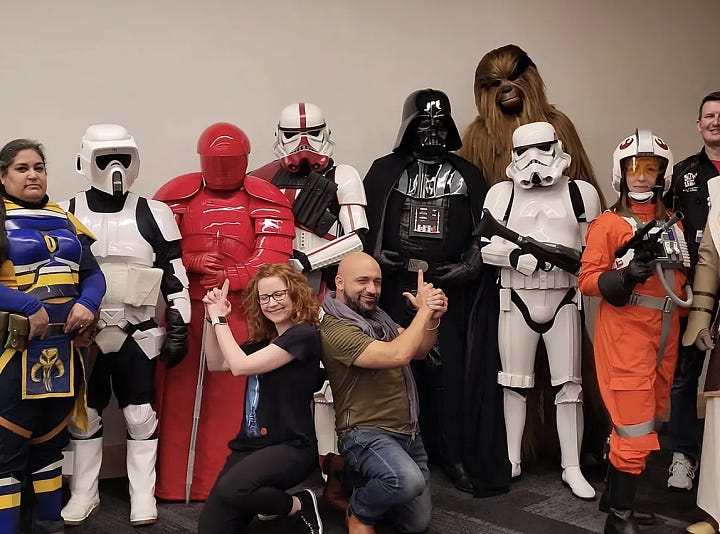
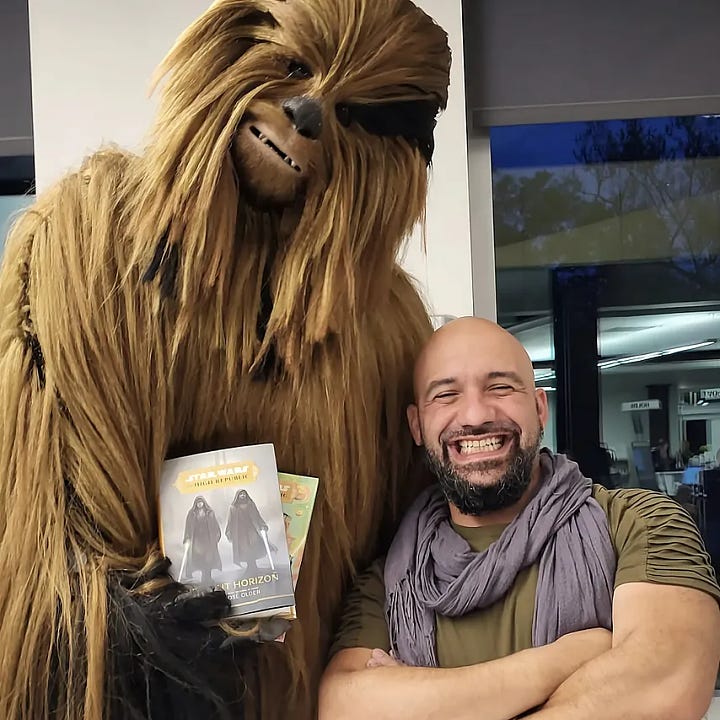
CH: I want to close by returning to something you brought up earlier, about being able to center characters in THE HIGH REPUBLIC who traditionally haven’t been the focus of a lot of sci-fi/fantasy — including, for most of its existence, STAR WARS. Conversations like this always make me think of Carl Sagan going on “THE TONIGHT SHOW” to bag on A NEW HOPE for being all-white and cheating Chewbacca, its only alien character, out of a major award because he wasn’t part of the right club. I know this is important to you in your own work, which is incredibly diverse — in fact, I think I read Han Solo is the only significant white character you’ve written in your books — so I was hoping you could talk about why this evolution of STAR WARS and the literary world is so important.
And as writers, we have one job, and that’s to tell the truth. Sometimes that truth comes with dinosaurs and laser swords.
DJO: To me, the question of diversifying literature always boils down to the simple fact of telling the truth. The world is diverse and our stories represent the world, even when they take place in the Galaxy Far Far Away, ergo therefore, etcetera, etcetera. It’s super basic, really. It actually requires an additional, unnecessary reach into the absurd to create worlds that are all white. It’s untrue. But largely that’s what Western literature — and history textbooks, for that matter — have been force-feeding us for centuries. A lie. And as writers, we have one job, and that’s to tell the truth. Sometimes that truth comes with dinosaurs and laser swords, but if we still need to find a resonance, a connectivity, a sense of honesty within all that magic. Otherwise, it’s meaningless.
CH: Absolutely.
DJO: So, look: when I sit down to write, am I aware that there’s an element of counter-narrative inherent to writing Black and brown folks into any given mythos that’s largely featured white leads? Absolutely. And that’s cool — I love a good counter-narrative. But at the core of this, I’m writing the world I know, plain and simple.
One of the most rewarding experiences with THE HIGH REPUBLIC— and I think you will hear this from creators across the board in STAR WARS media right now — has been the immense and overwhelming feedback from fans who are finally getting to see themselves as heroes in their favorite franchise, and in the process, finding out new things about themselves. That’s why we do this.
You can find Daniel José Older at his website and Twitter or here on Substack.
If this article added anything to your life, please consider buying me a coffee so I can keep this newsletter free for everyone.
PSALMS FOR THE END OF THE WORLD is out now from Headline Books, Hachette Australia, and more. You can order it here wherever you are in the world:




